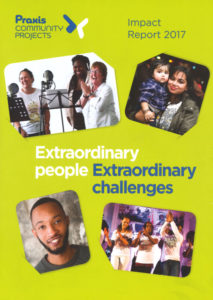The shameful treatment of elderly Commonwealth citizens treated as illegal immigrants was brought to public attention by the Guardian’s report in March on the refusal of NHS cancer treatment to 63-year-old Londoner Albert Thompson.
 On 28 March, Frances Webber and Jessica Perera of IRR News went to visit Bethan Lant of Praxis, the organisation helping him, to find out what it is like being a frontline organisation dealing with cases like his, at a time when legal aid has been cut massively, how these policies are impacting on particularly vulnerable categories (homeless, mentally ill, traumatised or sick migrants) and what more needs to be done to resist these measures.
On 28 March, Frances Webber and Jessica Perera of IRR News went to visit Bethan Lant of Praxis, the organisation helping him, to find out what it is like being a frontline organisation dealing with cases like his, at a time when legal aid has been cut massively, how these policies are impacting on particularly vulnerable categories (homeless, mentally ill, traumatised or sick migrants) and what more needs to be done to resist these measures.
IRR News: Before we get down to talk about the actual cases you are dealing with, could you tell our readers a little about Praxis and its work?
Bethan Lant (BL): Praxis has been around for about 35 years, and we work with migrants. If someone is here and is experiencing difficulties because of a migration issue, then we are here to work with them. We do quite a holistic model of advice, so at the moment we’re doing a lot of immigration advice and casework – in large part because of cuts to legal aid and because there simply isn’t the free advice for non-asylum issues, so we’ve ended up taking many cases that people can’t get advice for elsewhere. But we also try and help people to manage issues around destitution and access to services. We have Doctors of the World here three days a week, and we work with them to make sure people get access to health care; we provide a small amount of accommodation for people with a ‘no recourse to pubic funds’ condition, and also link with different shelters, making sure people can get into those; we also hold a couple of emergency grants to make small payments to people while we are trying to stabilise their situation.
So we are effectively a one-stop shop for people. But we also support the people we serve to develop and to have a voice on their own issues, so for example we took a group of women down to Parliament on Women’s Day (8 March), for the All Women Count campaign, and helped them speak to some of their MPs on their issues. So we very much try and help people use their lived experience to try and make change.
IRR News: So, in terms of the cases, how are your clients affected by all of these hostile environment measures, what other situations have you seen, apart from Albert Thompson’s case?
BL: In fact, Albert’s was quite an extreme case. He’s the only one of the 54 cases we are dealing with, where life-saving treatment has been refused without an upfront payment. The fact that they even asked him for papers, is something new. You can’t help wondering whether there is racial profiling going on? I certainly think if a white person in the same situation turned up at the hospital they would be very unlikely to be denied treatment.[1] I should mention that of the 54 cases of people with Indefinite Leave to Remain but without the documents to prove it, not all are retirement age Commonwealth citizens, but a substantial proportion are. We’ve had cases about people being unable to rent rooms, or access bank accounts, or benefits or local authority housing. Those are slightly older – social housing and benefits because those changes happened longer ago, but still people who have been on benefits for a long time and have never had documents checked but then have been changed over, they are now seeing that impact.
We do get people who the legislation is targeted at, like undocumented migrants, who we are working with, who had been managing before but now are destitute and on the streets, which isn’t really to anyone’s advantage. I can give you an example: a lady in her early 70s who doesn’t have any health problems or anything, who has an application in with the Home Office, whose son overseas had been paying for private rented accommodation for her. That rental ended, and she was not able to find other private rented available accommodation, even though she could pay for it, because of the new Right to Rent legislation. So now you have a 70-year-old woman sleeping on the streets, who before, was provided for and who has an ongoing application so can’t be removed at the moment, and that doesn’t benefit anyone.
IRR News: It seems that the legal aid cuts have also landed you with a lot of work?
BL: Over the last five years or so, the amount of immigration work we do has grown and now dwarfs everything else that we do. We used to do some basic applications before, but we would usually refer them on so we could do more complex cases and focus on other support, making sure people that people were alright while that was going on. Now we do that and the bulk of the immigration casework as well, and as you well know, with people only getting 30 months leave subject to ‘no recourse to public funds’, we have to keep applying to renew their leave and to lift conditions, so people are never leaving us. That pathway has become so long and complex, people’s cases go on for ages.
 IRR News: You’ve talked of the impact of the legal aid cuts on Praxis, but what about their impact on the victims of these cases?
IRR News: You’ve talked of the impact of the legal aid cuts on Praxis, but what about their impact on the victims of these cases?
BL: It’s huge, because it’s difficult to put some of these cases together, they are quite complicated, and we have seen from our own experience that the decision making process is quite capricious – you get one case that looks quite solid but is refused, and another case that isn’t quite as solid gets granted. So people really need expert advice in order to put together these applications. They need to know the law, they need to know what they need to prove, and that’s not easy to get from the resources that are out there. So people need expert advice, but getting it is expensive – and then there’s the application fee on top of that. If you just need a ‘no time limit’ card (for those who can prove they have ILR), that’s only £237, which in Home Office terms is nothing. But it you have to go down the twenty-year route,[2] you are looking at £1,500, if you include the immigration health surcharge. Yes, there are fee waivers available for that, but again, you need expert advice to get a fee waiver, because the Home Office make that so complicated and so detailed that you really need to know what you are doing when you are asking for that. So how are people who are already feeling the impact of being unable to access services, particularly those who have been denied benefits or other services, supposed to find that money to get that advice and to pay those fees?
IRR News: Does it tend to be people who have been here for a long time, and therefore older people, who are most affected by these cumulative hostile environment measures, or has it been more widespread?
BL: It has been more widespread. But it has particularly hit those people who have been used to an environment where you didn’t have to produce your documents, so it was never a priority to have that. In particular, those who came before 1973 (when the 1971 Immigration Act came into force), their experience is that it doesn’t matter, no one needs it, it’s just a formality. The environment has changed around them without notice, or certainly without telling them, and now they are finding that everything has changed and they really get caught out. Whereas for people who have come more recently, while they might lose documents, especially if they face mental health issues or other things, there’s usually some understanding that ‘people keep asking to see my documents, therefore I need to have my documents’.
IRR News: How do you see things in the future?
BL: It is difficult. We have been thinking about it from a policy perspective, and obviously our starting point is that no one should ever be denied medical treatment. That shouldn’t happen. The lengths that people have to go to evidence that they have rights are quite ludicrous. Someone like Albert, if he can’t find that one document, the grant of ILR, would have to find evidence of twenty years’ residence, at the end of which he would be granted a limited leave to remain with potentially no recourse to public funds, and would have to wait another ten years for settlement. The government needs to realise that is mad, they should be looking at a much more streamlined process, especially for people they know are going to be impacted, like the older Caribbean community. They should say that if someone can show on the balance of probabilities that they did have leave at some point, even if they haven’t got that document now, that should be enough for the grant of leave.
IRR News: Going back to the campaigning aspect, what response did you get from the Guardian article, was it mostly supportive? Did you get public support for more humane policies, in terms of NHS treatment and also for people who have been here for a long time?
BL: Yes, certainly the public response has been overwhelmingly positive. I think it was the way the Guardian story was presented: the headline talked about ‘Londoner denied cancer treatment’, not ‘migrant’, he’s a ‘Londoner’. And I think most people have experienced themselves or someone they know having had cancer and how stressing and troubling that is, and the thought that someone could just be denied treatment because of a piece of paper really hit home with a lot of people. So most of the response we’ve had has been very positive. There’s at least one petition going round which is garnering a huge amount of signatures asking the hospital to change their mind and grant Albert the medical treatment. There’s been a couple of follow-up articles, and comments still pop up on my social media feed quite regularly, posts on Twitter and Facebook, so it’s still attracting attention.
IRR News: What could communities do to prepare if they think they might face these hostile circumstances in the future, where they might be asked for documentation or so forth?
BL: There has to be some awareness raising amongst some of the communities who are going to be affected. I think the government should bear responsibility for that; if they are the ones making the changes, then it should be up to them to tell people who might be affected. But I think communities could do more; a lot of faith groups have a huge amount of contacts with people in these communities and could do some awareness raising. And anyone can do a subject access request, to get tax records and other evidence. Although the other point that really irks me is that the Home Office is trying to exempt itself from subject access under the new Data Protection regulations that are coming in. That would mean anyone subject to immigration control would have no right to access their data, let alone correct errors. To think that they can exempt themselves from giving you information, that they can hold all the cards, and not play at all!
The Home Office keeps making crosses for its own back in some ways. All these people that are unable to evidence their status, the Home Office is going to have to deal with, and all the people who are having to make applications to lift ‘no recourse’ conditions. But the Home Office has got all the time in the world, whereas the people are on the streets. The Home office literally holds all the cards in that way.
Related links
Sign the petition for Albert Thompson here

